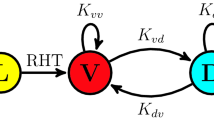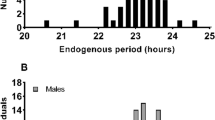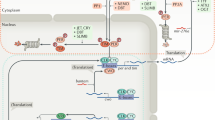Abstract
IN the issues of NATURE for April 4, 1925, and Mar. 5, 1927, were given brief accounts of the effects of subjecting juncos (Junco hyemalis) during the autumn to artificially increasing days in place of the normally decreasing days of that time of year. It was shown that in spite of extremely low temperatures, recrudescence of the gonads could thus be induced in mid-winter. Ordinary electric light bulbs were used as the source of illumination. This indicated that the changes could probably not be attributed to radiation. During the past winter, through a renewed grant from the Royal Society, it was possible to repeat these experiments and to introduce variations. A full account of these is shortly going to press. Considered together, they suggested that the development of the gonads was due directly to increasing activity made possible through daily extension of the waking hours.
This is a preview of subscription content, access via your institution
Access options
Subscribe to this journal
Receive 51 print issues and online access
$199.00 per year
only $3.90 per issue
Buy this article
- Purchase on Springer Link
- Instant access to full article PDF
Prices may be subject to local taxes which are calculated during checkout
Similar content being viewed by others
Author information
Authors and Affiliations
Rights and permissions
About this article
Cite this article
ROWAN, W. Reproductive Rhythm in Birds. Nature 122, 11–12 (1928). https://doi.org/10.1038/122011a0
Issue Date:
DOI: https://doi.org/10.1038/122011a0
This article is cited by
Comments
By submitting a comment you agree to abide by our Terms and Community Guidelines. If you find something abusive or that does not comply with our terms or guidelines please flag it as inappropriate.



